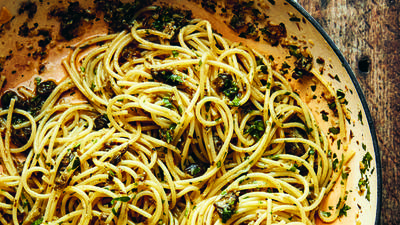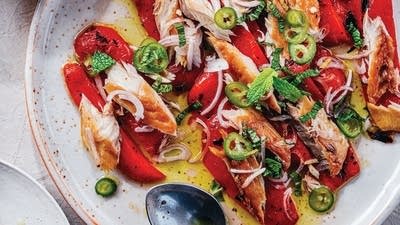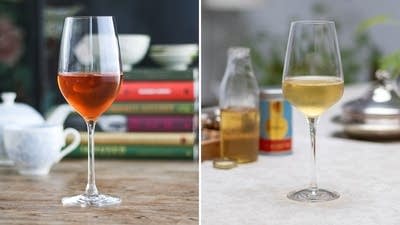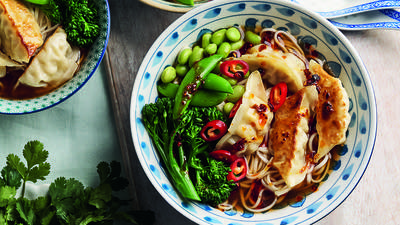
Before chef Edward Lee moved to the South, he didn’t know what sorghum was. Now he incorporates it into everything from ham to ice cream. Lee is the author of Smoke and Pickles: Recipes and Stories from a New Southern Kitchen.
Francis Lam: I want to start with one of the first stories I read in the book -- it really struck me. It's a story you tell of your sister taking you out, sneaking around and getting lamb gyros for lunch. You weren’t supposed to do that. On some level it was because lamb wasn’t a cool food in your family, but really it was because your mom didn’t want you to go out there.
Doing stuff that you are not supposed to be doing seems to be a theme in the book, and maybe even a theme in your life. If your parents are anything like mine, you know they probably wanted you to grow up to be a doctor or a lawyer like so many immigrant parents wanted their children to be. What was it like when you decided, “You know, I want to be a cook”?
 Edward Lee (Dan Dry)
Edward Lee (Dan Dry)
Edward Lee: It was a very awkward day for me and my parents. At the time, I was going to NYU and I was a lit major. My lit advisor was grooming me to go to grad school for literature and I told him I was going to chuck it all and become a cook. The look on his face, the look on my parents’ faces -- there was a lot of disappointment all around me.
I guess with any new immigration wave, there is always that push and pull between the values of the old country and the fascination and the exposure that you have to all the different cultures in what we call America. I don’t know what it was, but I knew from very early on that I was fascinated by culture. I was fascinated by falafels; I was fascinated by Indian food.
We had Jamaican neighbors and I used to love the smells that came from their kitchen. It was so foreign from the smells that came from my kitchen, but I loved that.
FL: At some point you have this hot, sexy, celebrity-studded restaurant called Clay in downtown Manhattan, but then -- boom -- you move to Louisville, Ky., and now you’re a chef in Louisville. I imagine you didn’t have that many Southern neighbors, so you probably didn’t smell collard greens growing up. When you got to Louisville, what were the foods and smells that inspired you there? What ingredients or traditions drew you in?
EL: I moved to Louisville about nine or 10 years ago, and I started to discover indigenous ingredients like country ham and sorghum. I’d never had sorghum until I moved down to Kentucky -- I didn’t know what sorghum was.
FL: What is sorghum?
 Smoke and Pickles
Smoke and Pickles
EL: Sorghum is a plant; it is very similar to sugar cane. It’s been grown here for generations. Much like sugar cane, you cut it down when it is ripe, you put it through rollers, and you press out the sorghum juice. Then you boil it very slowly over a number of hours at a very low temperature. Different sorghum producers will boil it to different grades of groundness, so you can get a light amber sorghum or a really dark sorghum, which is closer to molasses.
Once I tasted all the different variations of it, I was immediately hooked. The day I discovered sorghum, we basically stopped buying honey. We’d take country hams or city hams and we’d glaze the hams with sorghum.
The most obvious application would be dessert. We’d take cooked grits and we’d churn it into a sorghum-based cream ice cream, which is a really popular dish. I didn’t come to the South intending to be a Southern chef; I didn’t come here to put on a pair of dungarees and chew on some cornbread. But as a natural extension, if you are curious, you can’t help but be fascinated by these things that are happening around you and these traditions that you just walk into.
FL: You wrote something really interesting in the book too, which is that being in the South, you also rediscovered your own Koreanness and your own Korean traditions that you came from.
EL: Growing up in the big city, you don’t realize your ethnicity because everyone is ethnic. There is no ethnic because everyone is different and being different is what brings everyone together. I grew up knowing I was Korean, but I never grew up thinking I was “other” or different. It was just -- to use the cliche -- a big melting pot. Then you move to the South and it’s hard not to immediately recognize every time you walk out your door, that everyone looks the same except you. There is a homogenous culture here that is just different from the big city.
FL: You also said something interesting: Being an outsider you can cook the Southern food in a different way and they’ll let you do it in a different way.
EL: Again, it’s to your advantage and your disadvantage. I can get into some very heated arguments about cornbread recipes because, "This is the way we’ve been doing it for generations and you just don’t stray from that, not when it’s part of your family recipe." Then in comes me and I’ve got all these ideas of how to make things differently. What I don’t have is the baggage of 200 years of tradition on my shoulders. They kind of look at me and say, “There’s that funny-looking Asian kid putting soy sauce in everything again.” I’m allowed to make mistakes. I’m allowed to venture beyond the traditional canon of Southern recipes.
FL: Right, doing stuff you’re not supposed to do once again.
Before you go...
Each week, The Splendid Table brings you stories that expand your world view, inspire you to try something new, and show how food connects us all. We rely on your generous support. For as little as $5 a month, you can have a lasting impact on The Splendid Table. And, when you donate, you’ll join a community of like-minded individuals who love good food, good conversation, and kitchen companionship. Show your love for The Splendid Table with a gift today.
Thank you for your support.
Donate today for as little as $5.00 a month. Your gift only takes a few minutes and has a lasting impact on The Splendid Table and you'll be welcomed into The Splendid Table Co-op.





